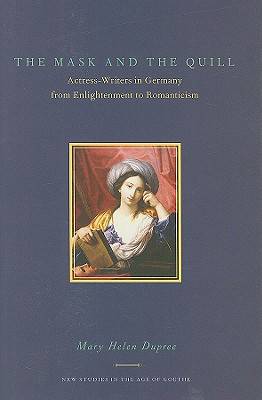
- Retrait gratuit dans votre magasin Club
- 7.000.000 titres dans notre catalogue
- Payer en toute sécurité
- Toujours un magasin près de chez vous
- Retrait gratuit dans votre magasin Club
- 7.000.0000 titres dans notre catalogue
- Payer en toute sécurité
- Toujours un magasin près de chez vous
The Mask and the Quill
Actress-Writers in Germany from Enlightenment to Romanticism
Mary Helen Dupree
102,45 €
+ 204 points
Description
In the last three decades of the eighteenth century, a small but significant number of German actresses, including Sophie Albrecht (1757-1840), Marianne Ehrmann (1755-1795) and Elise Bürger (1769-1833), began to publish poetry, autobiography, drama and short fiction under their own names. These "actress-writers" came of age at a time when the status of the actress was beginning to be radically redefined in accordance with Enlightenment aesthetics and the cult of sensibility, as the model of the enterprising actress-director in the tradition of Caroline Neuber gave way to an idealizing view of the actress as sentimental heroine. The Mask and the Quill: Actress-Writers in Germany from Enlightenment to Romanticism, is an exploration of this generation of actress-writers, their significance for German literary and cultural history, and their attempts to come to terms with the new image of the actress through literature and performance. In their texts and performances, Albrecht, Ehrmann and Bürger articulated an entirely new sense of what it meant to be an actress and a woman writer. They identified themselves with the cult of sensibility, with the theater reform movement, and above all with an image of the actress as Gefühlsschauspielerin or "actress of emotion," which emerged in the mid-1770s in response to the death of the Hamburg tragedienne Charlotte Ackermann (1757-1775). While some scholars have described this generation as a silent one, forced to submit to increasingly passive ideals of domesticity, actress-writers of the era defied this trend by using the image of the Gefühlsschauspielerin as a passport to literary activity. Their close relationship to theater and the nascent genre of "paratheatrical literature" provided them with a public voice, access to literary circles and a language with which to articulate their identity as actresses and as writers. More importantly, it provided them with a space from which to critique contemporary notions of gender and virtue.
Spécifications
Parties prenantes
- Auteur(s) :
- Editeur:
Contenu
- Nombre de pages :
- 200
- Langue:
- Anglais
- Collection :
Caractéristiques
- EAN:
- 9781611480245
- Date de parution :
- 12-05-11
- Format:
- Livre relié
- Format numérique:
- Genaaid
- Dimensions :
- 152 mm x 229 mm
- Poids :
- 498 g

Les avis
Nous publions uniquement les avis qui respectent les conditions requises. Consultez nos conditions pour les avis.






